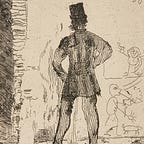You gotta look after yourself baby, but not for communication.
“You gotta look after yourself baby. Mild mannered or no, it’s just the way it is.”
Clem sat there dead-eyed and let the new mantra pass over.
Over and over again, Lem would say, over and over again, something new, sometimes the same, maybe something Clem hadn’t had to hear for weeks, maybe hours. He never told Lem to shut up. It wasn’t right. Lem shouldn’t have to shut up. Clem just had to get away. He didn’t want to. It was easier here. Simpler. Standardized.
“You know when you been licked cause that’s when you sit down and cry,” Lem said.
Tuesday, May 10th. The first time Clem remembered hearing that one and actually remembering what day it was. How many times had he had to hear it before he remembered hearing it? How many times before he looked at the date for the first time? This wasn’t the only one with these syntheses.
‘Creepy things’ll last forever if no-one’s there to pick them up.’ — April 18th ten years ago.
‘Last pool cool fool left running; walkin’ on water weren’t his thing.’ — November 24th one year ago.
‘When I tell it like it is it always seems to change. Think I’ll stop talkin’.’ — January 2nd.
That last was three months ago. Clem’s dead-eyed expression felt normal by then. He’d not seen everything there was to see, but he’d heard a lot. He probably hadn’t heard enough, but figured then that he was tired of listening; hence the dead eyes.
His eyes weren’t really dead. Just blurry. It wasn’t tears. It was boredom. Boredom and listening. Listening to the boredom. He remembered when Lem’s phrasing was exciting. He remembered when it was new. He remembered when he made the bet that Lem wasn’t gonna keep saying stuff just to say stuff. That eventually he’d have to say stuff because other people wanted him to say it or because he wanted other people to hear him say it, but not just for sayin’ it. Lem had started then. Maybe he’d said one of the phrases Clem had a date for. He didn’t have that date. It was a long time ago.
Clem and Lem grew up together. They’d grown up around each other. They’d grown together. These explained their consistency; inseparably interested. Clem didn’t feel too interested now, but he still thought about it. Lem was interested.
“Case I don’t know I write notes to my mind with the clouds,” he said.
He rarely didn’t know, Clem thought. He was nearly always right. Maybe not at the right time, and maybe not about what Clem was thinking about, or even about what he was thinking about, but a definite rightness existed. It was distracting.
Clem stood and walked to the window. Overlooking the dark woods. They’d been a part of his life. Lem’s life too. Their lives. They played there. They smoked there. They went to the edge and hooted at the cars passing by and through. None of what they did made any sense even then. Where had their parents gone? Neither of them remembered them, but barely.
Clem’s father and mother had been snarly older folk. Bent. Sheveled. Craning to look in the pot, out the window, into the neighbors’ business. Sometimes they’d stack themselves. Ma on top. Pa on top. Didn’t matter. It gave them the better view over the fence into the neighbors’ kitchen window. The neighbor moved out before Clem’s father and mother. Clem didn’t know where any of them had gone. Lem and he had played forts in the neighbors’ kitchen. They’d pounded a palisade of forks into the split and broken grout in-between the fancy italian tiles. Every now and then they’d look up and see Clem’s mother or father looking at them over the fence. Lem would shout something at them. They’d just stare. Lem’s remark was one of those that Clem remembered thinking to himself, ‘Lem can’t just keep saying things.’
Clem, staring out the window at the dark forest, thought he could remember what that remark was. “Double parent stack situation at fence o’clock.” Clem thought it might have been that. It didn’t matter.
Lem was standing beside him now. Staring at the wind turning the leaves. Silver. Green. Silver. Green. The heights of trees whipped in front of them. The birds flew wheeling backwards.
Clem had recorded just this scene once. Then he’d played it backwards in front of class telling the students that these were special birds. Birds that didn’t fly like any others. Birds that wheeled above the dark woods doing dark things and then sleeping at night. His peers had laughed at him. His peers had pointed out that they had seen this same scene as many times as he and had even played it backwards in their minds, in videos and in retrospect and they thought it interesting, but not worth spending more time on. Then they laughed again. Very abruptly.
How did the backwards flying birds get replaced? They were brushed away. Where to? They’d be back in the next windstorm. Where’d they go?
Lem hummed his latest phrase, “Bums babes blubadubba blandness blurls.”
Clem hadn’t heard blurls before. He wondered what it was. It could have been something. It could have been nothing. He’d tried asking Lem this same question. “What it is?” he’d asked. Lem had fumbled briefly with his lip, maybe reclaiming his own attempt at synthesis, and then he’d muttered, “Pancakes flap with or without berries. Something to do with carbs.” Clem’ed dropped to the floor at that point and just sat there and sulked. That was the last time he’d tried to make a say with Lem. They were meant for each other, but not for communication.
